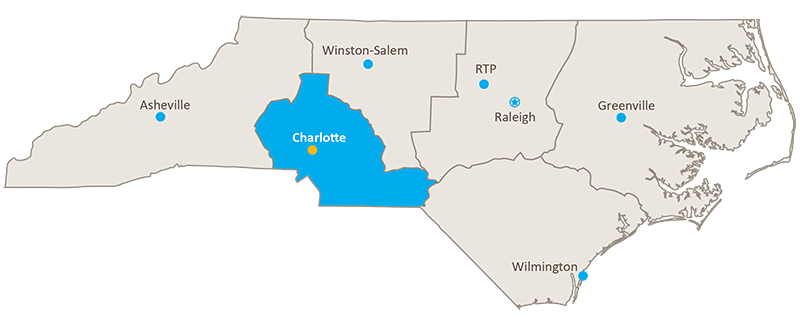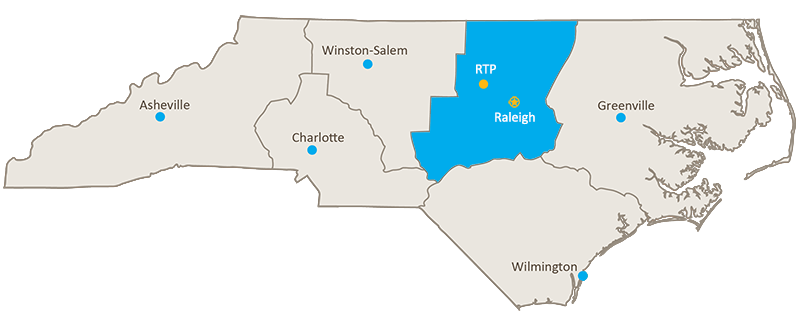
Shared Research Facilities and Equipment
Many facilities across North Carolina support life sciences research.
The listing covers core laboratory facilities at university and nonprofit research institutions that are open to researchers or collaborators outside of their home institutions.
Representatives of the core facilities listed below have voluntarily submitted their information. Not all institutions list available core lab facilities, but many are in the process of organizing and compiling these resources. As this information becomes available, we'll add those links.
NCBiotech has funded equipment in many core facilities in the state.
The Center's ongoing role is to provide this information portal. If you would like to submit a new listing or update an existing listing please fill this form.
The overall goal of the Choline & Metabolites Lab Facility is to provide cutting edge nutritional biochemical analysis of choline and metabolites in human, plant and mouse populations. To request choline & metabolites services, please complete our online service request form. [http://norc.sph.unc.edu/core_c/request_form.php]
Betaine, choline & metabolites, dimethylglycine, fatty acids, folate, homocysteine, methionine, phospholipid fatty acids, plasma, taurine, trimethylamine n-oxide (TMAO), trimethylamine (TMA), s-adenosylmethionine, sarcosine
- Human Performance, Nutrition, & Physiology
- Other -omics & Analytical
METRIC is focused on advanced molecular characterization and is one of five NC State Shared Core Research Facilities administered by the Office of Research and Innovation. We offer technical expertise and state-of-the-art instrumentation encompassing magnetic resonance spectroscopy, mass spectrometry, and X-ray crystallography.
Mass Spectrometry, NMR Spectroscopy, EPR, X-ray Crystallography
- Crystallography, X-ray Diffraction, NMR, & EPR
- Other -omics & Analytical
Our mission is to provide surgical, imaging, and functional assessment services with a focus on the cardiovascular system in rodents. The core facilitates the assessment of cardiovascular function in rodents and works with all interested investigators to develop new models of cardiovascular disease or modify existing protocols. Our services include animal model microsurgeries (e.g., myocardial infarctions, ischemia reperfusions, pressure overload, implantation and cannulation, artery ligation, and models of thrombosis, stroke, and cardiac arrest). We also can perform electrocardiography, pressure-volume loops, cardiomyocyte isolation, and Lagendorff and working heart perfusions. There are also self-service equipment offerings, which include ultrasound, microsurgical work station rental, non-invasive blood pressure monitoring, and intravital confocal microscopy. Our director will meet with interested parties to collaborate on study design model selection, and data acquisition.
animal surgery, non-invasive animal procedures
- Model Systems
Our mission is to help YOU with YOUR research.
We provide training, assistance and services in light microscopy, electron microscopy and image analysis.
Electron microscopy services include project consultation, sample preparation, imaging and training on transmission and scanning electron microscopes. Light microscopy services include project consultation and training on image acquisition. Laser scanning confocal, spinning disk confocal, light-sheet, widefield fluorescence, darkfield, and polarization microscopy available. Image analysis services including training on image analysis (3D and 2D analysis using Imaris and FIJI, colocalization, macros, etc.)
light microscopy, electron microscopy, confocal, live-cell imaging, transmitted electron microscopy, scanning electron microscopy, light-sheet microscopy, spinning disk confocal
- Imaging & Microdissection
Molecular genetics analysis including genotyping of populations for molecular markers analysis, QTL analysis and marker-assisted selection. The real-time PCR can be used for gene expression analysis. All investigators working at Mountain Horticultural Crops Research and Extension Center (MHCREC) will have free access to use any of these equipment for their research. However, they will have to schedule their time in coordination with the technician from the tomato breeding program. Investigators from outside the MHCREC are also encouraged to use the research facility whenever necessary. All users are expected to contribute supplies, particularly QIAxcel cartridge, micro plates, grinding beads, and tubes.
Capillary electrophoresis, DNA extraction, Genotyping, Marker-assisted selection (MAS), Real-time PCR
- Genetics & Genomics
The laboratory provides instrumentation, training, and assistance for multi-parameter flow cytometric analysis and sorting. It is available for use to all NCSU researchers and to those outside the NCSU community. The facility operates as a by appointment, fee for service lab.
Flow Cytometry, Cell Sorting, FACS, CytoFLEX, LSRII, MoFlo-XDP, Seahorse XF, Luna-II Cell Counter, Nanostring, RNA Quantification, Fluorophores, BSL2, BLS2+ Cell Sorting
- Cell/Tissue Culture & Flow Cytometry
The NMR Facility houses a JEOL 400MHz spectrometer with a 24 position sample changer system and a JEOL 500MHz spectrometer. Both normal geometry and capillary NMR probes are available for small molecule elucidation and high-throughput screening.
NMR structural analysis, NMR screening
- Crystallography, X-ray Diffraction, NMR, & EPR
The OneDukebio Integrated biospecimen Network (ODIN) is a shared resource created in 2021 that provides full-service biospecimen allocation and management. This state-of-the-art centralized biorepository follows biobanking best practices and operates under Good Clinical Laboratory Practice (GCLP) guidelines to ensure the integrity of specimens.
storage of blood, body fluids, and tissue, room temperature, 4°C, -80°C, -150°C liquid nitrogen
- Biorepository
The Pathology Services Core is a core facility in the UNC School of Medicine administered by the Lineberger Comprehensive Cancer Center and the Department of Pathology and Laboratory Medicine. We offer access to sophisticated digital pathology platforms and study design support to all UNC investigators to enhance translational research. Services are also open to users from other academic institutions and industry.
Processing, embedding, FFPE sectioning, Frozen sectioning, Tissue Micro Array (TMA) design and construction, H&E, special stains, IHC, multiplex IF, in situ hybridization (ISH and FISH), digital slide scanning and image storage, quantitative analysis of digital microscopy images, Pathologist consultation, Spatial Biology, spatial phenotyping.
- Pathology/Histology
Animal imaging and hyperthermia treatment analysis consisting of a Quantum Design, Inc., DM100 series magnetic hyperthermia instrument and K-Laser Cube infrared laser system.
hyperthermia and thermal imaging
- Imaging & Microdissection
- Nanotechnology
- Other -omics & Analytical







